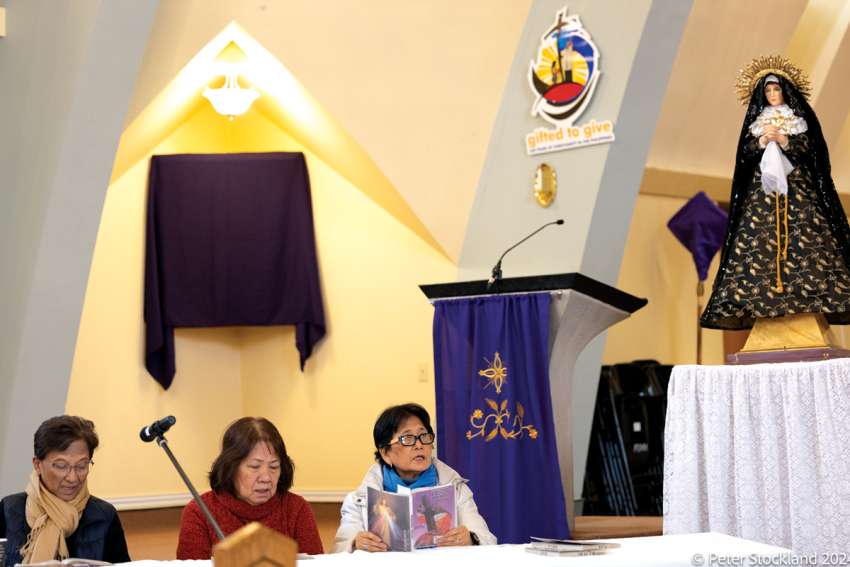Tuvida arrived in Canada in 1967 and quickly connected to the Filipino parish in Montreal. It was there she was introduced to the tradition of Pabása ng Pasyón or Reading of the Passion.
“I’m Filipino, but this was new for me,” Tuvida told The Catholic Register. Even though Tuvida speaks Tagalog, she says the poem uses a “deep Tagalog” that she needs to ask her friends for help in understanding.
The Pasyon Mahal is a 300-year-old Tagalog epic poem by Gaspar Aquino de Belén. The poem recounts the life, death and resurrection of Jesus. Every year during Holy Week, Filipino Catholics gather in homes and churches to sing the entire poem from beginning to end.
Though Tuvida says that some families recite the poem without a break, a process that takes over 24-hours, it is common practice to stage a multi-day event.
This year, parishioners began to chant on the Friday evening before Palm Sunday, paused to return home at night, and concluded following the Palm Sunday Mass.
Fr. Rommel Cruz, a member of a missionary order of priests from the Philippines and the new priest at the Mission, explained that the Payson is a wide-spread devotion in the Philippines.
“It is everywhere, especially in the Luzon area. It is very popular, especially during the old days.”
When asked what it is about Payson that makes it such a popular devotion, he replied with a laugh, “Because, you know, Filipinos love singing. It is something very dear to us.”
But it isn’t just the singing that brings people back every Holy Week.
“When you chant, it is very reflective,” he said. “It is not just about chanting. It will lead you to a deeper reflection. It needs patience. You need to chant for at least two hours. You cannot just come and go.”
Cruz says there is a “spiritual fulfillment that comes when you finish the process.”
For parishioner Alice Arceno, Pabasa is a “way for us to celebrate Holy Week as part of the Filipino tradition. If you understand the words, it really explains the whole life of Jesus and Mary.”
As with any Filipino event, food is involved. The basement of the St. Thomas the Apostle Church, where the Mission resides, had a table set up with both bowls of spaghetti and trays of Filipino favorites like pancit and biko. The Register team was asked twice, “Have you eaten?”
The FCMM was first founded in 1986 and then established as the only canonically established Filipino community in Canada in 1989.
“This is the only church in Canada that has been entrusted to the Filipinos. The purpose of the entrustment is to preserve the Filipino religious culture. Not just to preserve but to enrich and perpetrate,” said Cruz.
The tradition of Payson is one way Cruz is able to perpetrate that religious culture.
“Tomorrow, after the Palm Sunday Mass, the congregation will stay, and we will continue the chanting of the Passion. This way the parents can introduce it to the children.”


